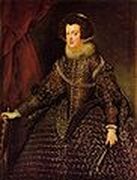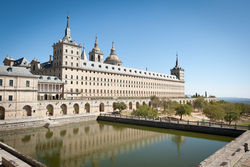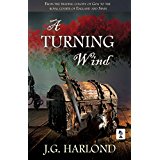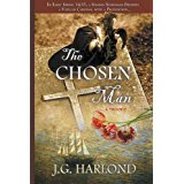Welcome to JG Harlond, author of the best selling historical novel series THE CHOSEN MAN. Today she tells us about Book Two, A TURNING WIND, and the historical background to it. It’s set in 1640 in the royal courts of Spain and France.
 King Felipe IV of Spain painted by Velasquez
King Felipe IV of Spain painted by Velasquez
Felipe IV of Spain, nicknamed el Rey Planeta by his contemporaries, presided over a court that was both pious and secretly decadent. A ‘lazy king’, he was said to have ignored the good government of his country by relying too heavily on his valido, the infamous Conde-Duque de Olivares, and devoting his time to collecting Old Masters, being painted himself by Velázquez, hunting, theatre-going and womanising. Felipe also presided over the beginning of the decline of the Spanish empire, and watched his children die until there was but one in-bred drooling son to follow him. Felipe himself was the son of Felipe III of Spain and Margarita Teresa of Austria, and already the product of Habsburg endogamy before he married a wife with Habsburg blood, and then when she died, his niece.
 Queen Isabel de Borbon painted by Velasquez
Queen Isabel de Borbon painted by Velasquez
Felipe’s first wife was Elisabeth of France, daughter of Henry IV and the odious Marie de Medici, and sister of Henrietta Maria, who at the time of my new novel, A Turning Wind, was Queen of England. Elisabeth, or Isabel as she came to be known, despaired of her husband’s over reliance on the dubious Conde-Duque de Olivares and constantly urged him to take charge of his country and its affairs as a good king should. After years of nagging and getting nowhere, Elisabeth resorted to conspiring with other Spanish nobles to remove Olivares as Chief Minister altogether. The Queen, who was renowned for her beauty, intelligence and ‘noble’ character, was very popular with the Spanish people, but this may have had a lot to do with the fact that she openly opposed the much hated valido. Eventually, by allying herself with Olivares’ nephew and successor, Luis de Haro, Elisabeth succeeded in ousting Olivares and for a brief period Elisabeth held considerable influence over Felipe and his empire. This is the background to my new novel, A Turning Wind, the second story in The Chosen Man trilogy.
 El Escorial
El Escorial
A great deal has been written about what was going on in both Spain and England during this period, which is the run up to the English Civil War. What is less well known is that Spanish and English ambassadors were drawing up a treaty to allow Spanish tercios (fighting to recover the Spanish Netherlands) to use southern England as a land bridge to Flanders. This was needed because French ships were constantly sinking Spanish troop vessels in the English Channel despite the Queen of Spain being French, and the Queen of France being Spanish. Basically, all of Europe was at each other’s throats in the early seventeenth century – but Felipe IV of Spain tried not to let it worry him too much. Like the King of England, who was trying to ignore an elected Parliament and gathering internecine war clouds, Felipe focused on hunting and art. Collecting Old Masters was seen as an important part of a monarch’s reign for it showed their power and good taste.
The background reading and research for A Turning Wind took a long time because before writing a story involving the Queen of England and the Queen of Spain I needed to sort out who was where and why, before I could even get down to who was doing what between 1639 and 1641. But it was fascinating; and having access to Henrietta Maria’s letters to her husband made it that much more personal, although that part comes into the next book By Force of Circumstance, out later this year.
In A Turning Wind, the wily merchant-rogue Ludo da Portovenere is taking secret messages from the British monarchs to Madrid. Here is a scene set in El Escorial, which I knew pretty well having lived nearby for many years.
The background reading and research for A Turning Wind took a long time because before writing a story involving the Queen of England and the Queen of Spain I needed to sort out who was where and why, before I could even get down to who was doing what between 1639 and 1641. But it was fascinating; and having access to Henrietta Maria’s letters to her husband made it that much more personal, although that part comes into the next book By Force of Circumstance, out later this year.
In A Turning Wind, the wily merchant-rogue Ludo da Portovenere is taking secret messages from the British monarchs to Madrid. Here is a scene set in El Escorial, which I knew pretty well having lived nearby for many years.

Ludo, who is in Spain on a secret mission for England which he intends to turn to his own advantage, is in the studio of Diego Velázquez.
(Ludo) was interrupted by voices from behind him, the King’s slow drawl – a voice that suggested the speaker was almost too lazy to talk – and another, deeper, more resonant voice. He turned back to face the room. Felipe was holding a swarthy man of middle years by the arm and pointing with his other hand at a half-completed brown horse prancing away from the viewer. The artist, whose jet-black hair and moustache contrasted sharply with his surprisingly clean smock, responded cautiously but firmly. Felipe wasn’t going to get his own way by the sound of it.
Deciding not to listen for fear of being dragged in as adjudicator, Ludo began looking at portraits in various stages of completion, noting how the Habsburg jaw ruined gentle brows above smiling blue eyes; how the present queen was painted into an armament of upholstery; how – and this could be useful – how the artist Velázquez had recreated the faces of his sitters to perfection, but had been unable to capture any semblance of equine beauty in the equestrian portraits. Prince Balthasar, for example, a good-looking boy despite his lineage, had been saddled with, literally, various lumps of bay rump and diminutive hooves pawing the air. The ‘draft’ for the latest portrait – Ludo had no idea of the terminology but these were evidently practice runs – lost any intimation of forthcoming majesty in its subject as the eye was drawn to the over-fed quarters of a barrel-bellied hack.
Lost in his musing, Ludo failed to see Doña Isabel enter the long studio with a young lady-in-waiting. When he noticed her, she was already at his side.
“Your Majesty,” he blustered, “forgive me. I was thinking about the paintings.”
“Don Ludovico what a pleasure, we did not know you were here. You are admiring Don Diego’s work.”
It was a statement not a question, and indeed, who could not admire the man’s work, or that of his apprentices mixing paints and preparing palettes further down the open studio.
“I am Your Majesty, although . . .”
“Although?” Doña Isabel’s pleasant tone with its slight French accent rose questioningly. “You find something at fault?”
“No, indeed, Your Majesty, I was merely lamenting . . . No, that is not the correct word. To be honest, I was regretting that the young prince, as heir to the throne, could not have been seated on one of my special Arab horses. They are so fine, so exquisitely designed they would – erm – lend more grandeur to his youthful nobility.” Ludo found himself running out of imagination . . . He could not recall a woman with such dark perceptive eyes, except Leonora in Goa, about whom he chose not to recall anything if he could help it.
“Arab horses, you say? Do we have these horses in Spain? We must for the Moors were here for many generations.”
“I cannot say, ma’am. I first encountered them in a country across the other side of the world. They are exquisite.”
“And how do they differ, please, from my son’s mount here? How are they better?”
“I would not say they are ‘better’, ma’am, but they are more beautiful. They have big, honest eyes; a face that is appealing, attractive; they are not large, as our working horses here are large, or broad as is the Prince’s mount here, but they are immensely strong, and so full of life . . . Let me tell you a refrain, a proverb about the Arab horse: God spoke to the south wind, saying: ‘I will create from you a being which will be happiness to the good and misfortune to the bad. Happiness shall be on its forehead, bounty on its back, and joy in the possessor.’”
The Queen stared into Ludo’s eyes. A smile formed about her small, full mouth. Ludo had to school himself not to take her hand. To cover his feelings he added, “‘Bounty on its back and joy in the possessor’, this would be a mount worthy of a future king and emperor.”
“If he has an empire over which to rule,” murmured the Queen quietly.
“Everything you do is for your son?” Ludo ventured, playing his second card according to his discussion with Henrietta Maria and his subsequent commission.
“Everything.”
“Could you not use your son to maintain what is his?” Ludo half-turned so anybody watching them could not see what he was saying. “Take the Prince with you to the King and let him show or explain to His Majesty how his country is being wracked by continual wars, how he might lose his birthright and suffer because of . . .” Ludo dropped his voice even lower, “your enemy.”
“Use a child as a pawn?” The Queen snapped, her voice now sharp with disgust.
Heads turned. Surreptitiously, Ludo moved her on to another painting and they stood as if observing its lines and colours. “Tell me,” he said, “why such a simple honest strategy would not influence the King? Surely he must think of the Prince’s future above all.”
“Yes, of course he does, but our son is still under the Countess-Duchess Olivares’ tutelage. For this approach I must wait until he is free of her control.”
Ludo recognised the excuse: Isabel was more afraid of the dragon-wife than the gargoyle husband. “Might I remind Your Majesty that in Florence it is said a true Florentine’s first waking thought is ‘who can I dupe today’ – I say ‘dupe’, ‘cheat’ is too strong and I cannot find a good translation for the Spanish word engañar. But my point is that you are of Medici blood, madonna. Use your wiles to obtain what you seek.”
“My mother is a Medici, and all her life she has done exactly what you have described. And what has she obtained? Exile, ignominy and poverty. I also have proud, noble Habsburg blood, Don Ludovico: I will not be seen to be meddling in His Majesty’s affairs.”
So you want me to do it, Ludo thought, inclining his head as if accepting Isabel’s reasoning. Expecting to be dismissed, he bowed again, ready to leave.
To his astonishment, the Queen placed her hand on his arm, saying for anyone to hear, “I would speak of this more – and other matters related to your more recent travels – attend us this evening after the siesta hour.” She then turned and went to her husband’s side, saying, “Don Ludovico promises to tell us of his travels this afternoon.”
Ludo stayed rooted to the spot, unsure, for a very rare moment in his life, what to do next. Then he gave a mental skip and a jump: the seeds of his release had been sown. Isabel had rejected his logical strategy too quickly; she would be thinking about it for the rest of the day. Thinking about it and realising, consciously or not, that he was not in Spain to murder her enemy. Henrietta Maria had told him to ‘get rid of’ her sister’s enemy and there were various ways that could be achieved without violence.
(From, A Turning Wind, Penmore Press, 2018 © J.G. Harlond)
(Ludo) was interrupted by voices from behind him, the King’s slow drawl – a voice that suggested the speaker was almost too lazy to talk – and another, deeper, more resonant voice. He turned back to face the room. Felipe was holding a swarthy man of middle years by the arm and pointing with his other hand at a half-completed brown horse prancing away from the viewer. The artist, whose jet-black hair and moustache contrasted sharply with his surprisingly clean smock, responded cautiously but firmly. Felipe wasn’t going to get his own way by the sound of it.
Deciding not to listen for fear of being dragged in as adjudicator, Ludo began looking at portraits in various stages of completion, noting how the Habsburg jaw ruined gentle brows above smiling blue eyes; how the present queen was painted into an armament of upholstery; how – and this could be useful – how the artist Velázquez had recreated the faces of his sitters to perfection, but had been unable to capture any semblance of equine beauty in the equestrian portraits. Prince Balthasar, for example, a good-looking boy despite his lineage, had been saddled with, literally, various lumps of bay rump and diminutive hooves pawing the air. The ‘draft’ for the latest portrait – Ludo had no idea of the terminology but these were evidently practice runs – lost any intimation of forthcoming majesty in its subject as the eye was drawn to the over-fed quarters of a barrel-bellied hack.
Lost in his musing, Ludo failed to see Doña Isabel enter the long studio with a young lady-in-waiting. When he noticed her, she was already at his side.
“Your Majesty,” he blustered, “forgive me. I was thinking about the paintings.”
“Don Ludovico what a pleasure, we did not know you were here. You are admiring Don Diego’s work.”
It was a statement not a question, and indeed, who could not admire the man’s work, or that of his apprentices mixing paints and preparing palettes further down the open studio.
“I am Your Majesty, although . . .”
“Although?” Doña Isabel’s pleasant tone with its slight French accent rose questioningly. “You find something at fault?”
“No, indeed, Your Majesty, I was merely lamenting . . . No, that is not the correct word. To be honest, I was regretting that the young prince, as heir to the throne, could not have been seated on one of my special Arab horses. They are so fine, so exquisitely designed they would – erm – lend more grandeur to his youthful nobility.” Ludo found himself running out of imagination . . . He could not recall a woman with such dark perceptive eyes, except Leonora in Goa, about whom he chose not to recall anything if he could help it.
“Arab horses, you say? Do we have these horses in Spain? We must for the Moors were here for many generations.”
“I cannot say, ma’am. I first encountered them in a country across the other side of the world. They are exquisite.”
“And how do they differ, please, from my son’s mount here? How are they better?”
“I would not say they are ‘better’, ma’am, but they are more beautiful. They have big, honest eyes; a face that is appealing, attractive; they are not large, as our working horses here are large, or broad as is the Prince’s mount here, but they are immensely strong, and so full of life . . . Let me tell you a refrain, a proverb about the Arab horse: God spoke to the south wind, saying: ‘I will create from you a being which will be happiness to the good and misfortune to the bad. Happiness shall be on its forehead, bounty on its back, and joy in the possessor.’”
The Queen stared into Ludo’s eyes. A smile formed about her small, full mouth. Ludo had to school himself not to take her hand. To cover his feelings he added, “‘Bounty on its back and joy in the possessor’, this would be a mount worthy of a future king and emperor.”
“If he has an empire over which to rule,” murmured the Queen quietly.
“Everything you do is for your son?” Ludo ventured, playing his second card according to his discussion with Henrietta Maria and his subsequent commission.
“Everything.”
“Could you not use your son to maintain what is his?” Ludo half-turned so anybody watching them could not see what he was saying. “Take the Prince with you to the King and let him show or explain to His Majesty how his country is being wracked by continual wars, how he might lose his birthright and suffer because of . . .” Ludo dropped his voice even lower, “your enemy.”
“Use a child as a pawn?” The Queen snapped, her voice now sharp with disgust.
Heads turned. Surreptitiously, Ludo moved her on to another painting and they stood as if observing its lines and colours. “Tell me,” he said, “why such a simple honest strategy would not influence the King? Surely he must think of the Prince’s future above all.”
“Yes, of course he does, but our son is still under the Countess-Duchess Olivares’ tutelage. For this approach I must wait until he is free of her control.”
Ludo recognised the excuse: Isabel was more afraid of the dragon-wife than the gargoyle husband. “Might I remind Your Majesty that in Florence it is said a true Florentine’s first waking thought is ‘who can I dupe today’ – I say ‘dupe’, ‘cheat’ is too strong and I cannot find a good translation for the Spanish word engañar. But my point is that you are of Medici blood, madonna. Use your wiles to obtain what you seek.”
“My mother is a Medici, and all her life she has done exactly what you have described. And what has she obtained? Exile, ignominy and poverty. I also have proud, noble Habsburg blood, Don Ludovico: I will not be seen to be meddling in His Majesty’s affairs.”
So you want me to do it, Ludo thought, inclining his head as if accepting Isabel’s reasoning. Expecting to be dismissed, he bowed again, ready to leave.
To his astonishment, the Queen placed her hand on his arm, saying for anyone to hear, “I would speak of this more – and other matters related to your more recent travels – attend us this evening after the siesta hour.” She then turned and went to her husband’s side, saying, “Don Ludovico promises to tell us of his travels this afternoon.”
Ludo stayed rooted to the spot, unsure, for a very rare moment in his life, what to do next. Then he gave a mental skip and a jump: the seeds of his release had been sown. Isabel had rejected his logical strategy too quickly; she would be thinking about it for the rest of the day. Thinking about it and realising, consciously or not, that he was not in Spain to murder her enemy. Henrietta Maria had told him to ‘get rid of’ her sister’s enemy and there were various ways that could be achieved without violence.
(From, A Turning Wind, Penmore Press, 2018 © J.G. Harlond)

The Chosen Man and A Turning Wind are available from book stores and on-line retailers. Her is the Amazon UK link for books by J.G. Harlond.
You can find out more about the author on: www.JGHarlond.com
Or visit her blog ‘Reading and Writing’:
You can find out more about the author on: www.JGHarlond.com
Or visit her blog ‘Reading and Writing’:
Find Jane on Twitter: @JaneGHarlond


Recent Comments